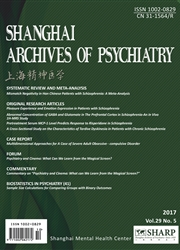

 中文摘要:
中文摘要:
概述:现有的精神疾病诊断系统主要是依据症状学来分类的。最近一项跨病种全基因组关联分析研究显示,在临床诊断为精神分裂症、双相障碍、抑郁症、注意缺陷多动障碍以及孤独症谱系障碍等疾病的患者中,染色体3p21和10q24区域内的基因具有相似性,两条L-型电压门控钙离子通道亚基基因CACNA1C和CACNB2的单核苷酸多态性也相似。这些研究结果表明这五种看似独立的疾病其病理机制存在着某种关联。这种跨病种研究对现有以症状为基础的精神疾病诊断分类系统提出了挑战。研究人员需要找出创造性方法,消除这两种不同方法对精神障碍理解、分类间的差异。
 英文摘要:
英文摘要:
The present diagnostic classification of mental illnesses is primarily based on symptomatology. A recent cross-disorder genome-wide association study revealed that there were genetic similarities between multiple clinically defined diagnoses(including schizophrenia, bipolar disorder, depression, attention deficit hyperactivity disorder, and autism spectrum disorder) on regions of chromosomes 3p21 and 10q24 and single-nucleotide polymorphisms(SNPs) within two L-type voltage-gated calcium channel subunits of CACNA1 C and CACNB2. These findings suggest that the pathogenesis of these five independent disorders are related. Such cross-disorder genetic studies challenge the current symptom-based diagnostic classification of mental disorders. Researchers need to identify creative ways to bridge the gap between these two approaches to understanding and labelling mental disorders.
 同期刊论文项目
同期刊论文项目
 同项目期刊论文
同项目期刊论文
 期刊信息
期刊信息
